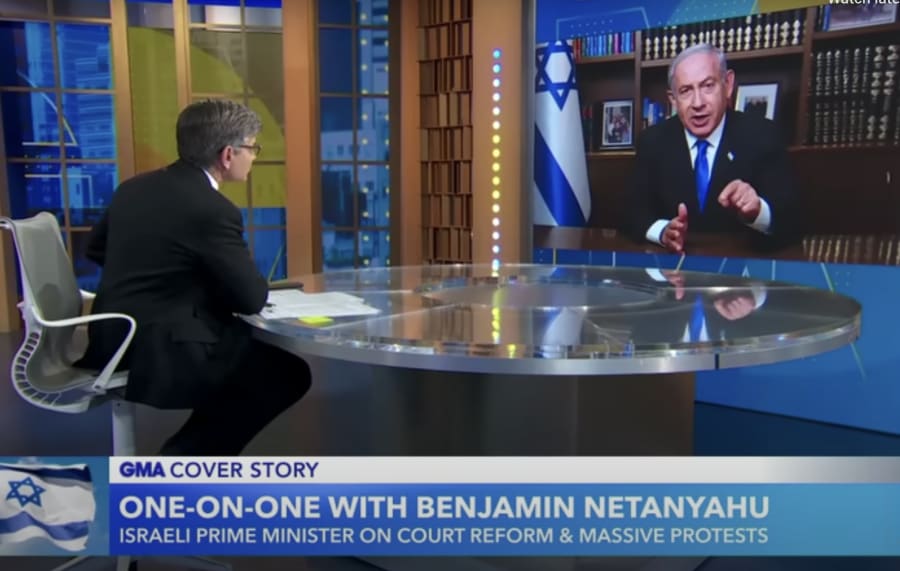During US media blitz, Netanyahu reassures viewers it’s not ‘the end’ of Israeli democracy
Israeli premier says the contentious Reasonableness Standard Law is a ‘minor correction’ to ‘the most activist judicial court on the planet’

Israeli Prime Minister Benjamin Netanyahu gave a series of interviews to U.S. media outlets on Thursday, following his government’s passing of a contentious judicial overhaul law on Monday.
The Israeli premier is often criticized by Israeli media for not giving enough interviews to Hebrew outlets at this critical hour.
Netanyahu told ABC News that the ‘Reasonableness Standard Law’ is just a “minor correction” to “the most activist judicial court on the planet.”
"It's described as the end of Israeli democracy – I think that's silly and when the dust settles, everybody will see it,” he said, fending off the criticism.
“The essence of democracy is the balance between the will of the majority and the rights of the minority, and that's achieved by the balance between the three branches of government," Netanyahu explained. "That's been taken off the rails in Israel in the last 20 years.”
Netanyahu insisted that his government is working to restore the balance between state authorities that was disrupted by an overreaching Supreme Court.
"I want to bring the pendulum to the middle, I don't want to bring the pendulum to the other side," the premier told George Stephanopoulos on ‘Good Morning America’. "But we have to correct it and that's what we just did. It's a minor correction."
Even though weeks of negotiations with the opposition have failed, Netanyahu expressed optimism about the chances of reaching a broad consensus this time around.
"I'm actually more optimistic now than I was before,” he stressed. “Now that they can see that we are prepared to move without them… maybe we will be able to move with them. And I hope the opposition leaders will come to the middle. There is a middle out there.”
During an interview with CNN, Netanyahu was asked about a scenario in which the Israeli Supreme Court would decide to strike down the legislation that aims to limit its own power. The court in Jerusalem will reportedly begin studying petitions against the law in September.
“What you’re talking about is a situation, or potential situation, where in American terms, the United States’ Supreme Court would take a constitutional amendment and say that it’s unconstitutional. That’s the kind of, the kind of spiral that you’re talking about, and I hope we don’t get to that,” Netanyahu told CNN anchor Wolf Blitzer.
Netanyahu revealed in a conversation with NPR that he is not planning to fire Israel’s attorney general, Gali Baharav Miara.
"It's not even on the table and it won't happen," he said.
The premier was asked if now he will appoint the ultra-Orthodox Shas party leader Aryeh Deri to a senior position in his government, now that the 'reasonableness' standard has been scrapped.
"Well, you know, it depends what happens, of course, with the legislation, we have to see. But if it stands, I expect it to happen,” he replied.
The Israeli court has stated that appointing Deri, an ultra-Orthodox confidant of Netanyahu, as minister is “unreasonable in the extreme” due to his two prior convictions, including a plea deal for tax fraud last year. However, there is no Israeli law that explicitly prevents such an appointment because he resigned from the Knesset before a ruling could be given regarding moral turpitude – which would have prevented him from holding any public office for 7 years. In the end, Deri was democratically elected to the Knesset.
Regarding his ongoing trial, Netanyahu emphasized: “There's no connection between this judicial reform, which is very broad, and my trial.”
Regarding current relations with the United States, Netanyahu told ABC News that “they are as strong as ever.”
“The U.S. is our irreplaceable and indispensable ally. We have no better friend, and the United States has no better friend than Israel,” he stated.
Netanyahu said that U.S. President Joe Biden invited him to the White House in the last call, adding the visit is expected to take place “in the fall, I think it’s in September but we’ll finalize the date.”

Tal Heinrich is a senior correspondent for both ALL ISRAEL NEWS and ALL ARAB NEWS. She is currently based in New York City. Tal also provides reports and analysis for Israeli Hebrew media Channel 14 News.














